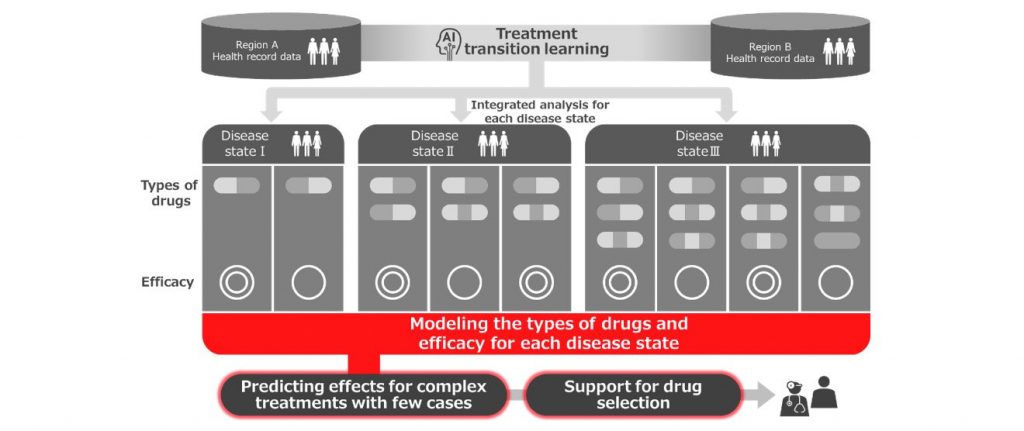
Tokyo, Salt Lake City, Indianapolis, March 25, 2022 – Hitachi, Ltd. (TSE: 6501, Hitachi), University of Utah Health (U of U Health), and Regenstrief Institute, Inc. (Regenstrief) today announced the development of an AI method to improve care for patients with type 2 diabetes mellitus who need complex treatment. One in 10 adults worldwide have been diagnosed with type 2 diabetes, but a smaller number require multiple medications to control blood glucose levels and avoid serious complications, such as loss of vision and kidney disease.
For this smaller group of patients, physicians may have limited clinical decision-making experience or evidence-based guidance for choosing drug combinations. The solution is to expand the number of patients to support development of general principles to guide decision-making. Combining patient data from multiple healthcare institutions, however, requires deep expertise in artificial intelligence (AI) and wide-ranging experience in developing machine learning models using sensitive and complex healthcare data.
Hitachi, U of U Health, and Regenstrief researchers partnered to develop and test a new AI method that analyzed electronic health record data across Utah and Indiana and learned generalizable treatment patterns of type 2 diabetes patients with similar characteristics. Those patterns can now be used to help determine an optimal drug regimen for a specific patient.
Some of the results of this study are published in the peer-reviewed medical journal, Journal of Biomedical Informatics, in the article, “Predicting pharmacotherapeutic outcomes for type 2 diabetes: An evaluation of three approaches to leveraging electronic health record data from multiple sources”.
Hitachi had been working with U of U Health for several years on development of a pharmacotherapy selection system for diabetes treatment[1]. However, the system was not always able to accurately predict more complex and less prevalent treatment patterns because it did not have enough data. In addition, it was not easy to use data from multiple facilities, as it was necessary to account for differences in patient disease states and therapeutic drugs prescribed among facilities and regions. To address these challenges, the project partnered with Regenstrief to enrich the data it was working with.
The new AI method initially groups patients with similar disease states and then analyzes their treatment patterns and clinical outcomes. It then matches the patient of interest to the disease state groups and predicts the range of potential outcomes for the patient depending on various treatment options. The researchers evaluated how well the method worked in predicting successful outcomes given drug regimens administered to patients with diabetes in Utah and Indiana. The algorithm was able to support medication selection for more than 83 percent of patients, even when two or more medications were used together.
In the future, the research team expects to help patients with diabetes who require complex treatment in checking the efficacy of various drug combinations and then, with their doctors, deciding on a treatment plan that is right for them. This will lead not only to better management of diabetes but increased patient engagement, compliance, and quality of life.
The three parties will continue to evaluate and improve the effectiveness of the new AI method and contribute to future patient care through further research in healthcare informatics.
Hitachi will accelerate efforts, including the practical application of this technology through collaboration between its healthcare and IT business divisions and R&D group. GlobalLogic Inc., a Hitachi Group Company and leader in Digital Engineering, is promoting healthcare-related projects in the U.S., will also deepen the collaboration in this field. Through these efforts, the entire Hitachi group will contribute to the health and safety of people.

About Hitachi, Ltd.
Hitachi, Ltd. (TSE: 6501), headquartered in Tokyo, Japan, contributes to a sustainable society with a higher quality of life by driving innovation through data and technology as the Social Innovation Business. Hitachi is focused on strengthening its contribution to the Environment, the Resilience of business and social infrastructure as well as comprehensive programs to enhance Security & Safety. Hitachi resolves the issues faced by customers and society across six domains: IT, Energy, Mobility, Industry, Smart Life and Automotive Systems through its proprietary Lumada solutions. The company’s consolidated revenues for fiscal year 2020 (ended March 31, 2021) totaled 8,729.1 billion yen ($78.6 billion), with 871 consolidated subsidiaries and approximately 350,000 employees worldwide. For more information on Hitachi, please visit the company’s website at https://www.hitachi.com.
About University of Utah Health
University of Utah Health provides leading-edge and compassionate medicine for a referral area that encompasses 10% of the U.S., including Idaho, Wyoming, Montana and much of Nevada. A hub for health sciences research and education in the region, U of U Health has a $428 million research enterprise and trains the majority of Utah’s physicians, including more than 1,250 health care providers each year at its Schools of Medicine and Dentistry and Colleges of Nursing, Pharmacy and Health. With more than 20,000 employees, the system includes 12 community clinics and four hospitals. For ten straight years, U of U Health has ranked among the top 10 U.S. academic medical centers in the Vizient Quality and Accountability Study.
About Regenstrief Institute
Founded in 1969 in Indianapolis, the Regenstrief Institute is a local, national, and global leader dedicated to a world where better information empowers people to end disease and realize true health. A key research partner to Indiana University, Regenstrief and its research scientists are responsible for a growing number of major healthcare innovations and studies. Examples range from the development of global health information technology standards that enable the use and interoperability of electronic health records to improving patient-physician communications, to creating models of care that inform practice and improve the lives of patients around the globe.
Sam Regenstrief, a nationally successful entrepreneur from Connersville, Indiana, founded the institute with the goal of making healthcare more efficient and accessible for everyone. His vision continues to guide the institute’s research mission.
Business Contacts:
Research & Development Group, Hitachi, Ltd.
https://www8.hitachi.co.jp/inquiry/hqrd/news/en/form.jsp
The University of Utah Health
30N 1900E
Salt Lake City, UT 84132
Julie Kiefer
(801) 587-1293
Send email
Regenstrief Institute
1101 West Tenth Street
Indianapolis, IN 46202
John Erickson
(317) 643-2313
joerick@regenstrief.org









